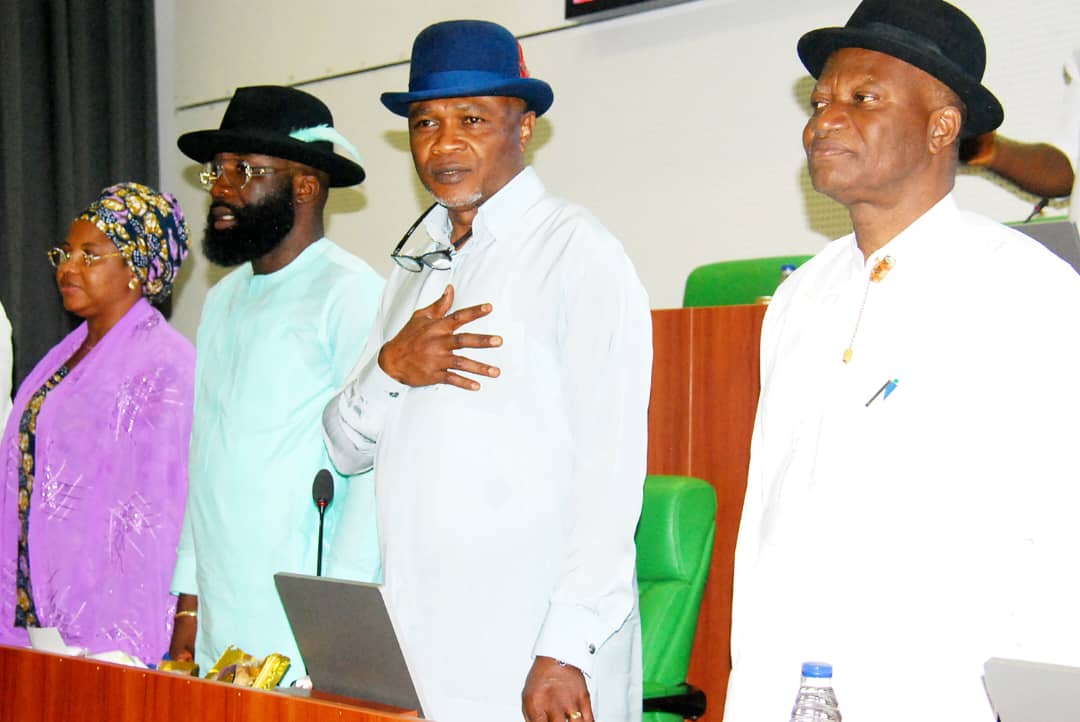Speaker Abbas has pledged that the 10th House will ensure full transparency, accountability, and effective execution of the Federal Government’s naira-for-crude oil policy

The Speaker of the House of Representatives, Rep. Abbas Tajudeen, has pledged that the 10th House will ensure full transparency, accountability, and effective execution of the Federal Government’s naira-for-crude oil policy.
Represented by the Minority Leader, Rep. Kingsley Chinda, at the inauguration of the Ad-hoc Committee on the Implementation and Oversight of the policy, Speaker Abbas described the initiative as “a crucial step toward strengthening transparency and efficiency in one of Nigeria’s most important energy-sector programmes.”
He said the committee carries “the vital responsibility of monitoring implementation, ensuring inter-agency coordination, and assessing the policy’s effectiveness,” adding:
“Its work is critical to making sure the objectives of the policy are met, and that any gaps in execution are promptly addressed. The House expects nothing less than a thorough, impartial, and well-documented process that contributes to the stability of our economy.”
Abbas stressed that the policy has “far-reaching implications for Nigeria’s foreign-exchange stability, revenue generation, and long-term energy security,” noting that a comprehensive review would determine if its goals are being achieved and what adjustments are needed.
“Such an assessment will provide the House with clearer guidance in exercising its legislative commitment. We trust the committee to deliver results that meet the expectations of this chamber and the hopes of the people we serve,” he added.
Reaffirming support for President Bola Tinubu’s renewed hope agenda, the speaker said the legislature remains “a true partner in progress by aligning its priorities with the aspirations of the people and the policy direction of government,” working across party lines to “promote sustainable growth, enhance citizens’ welfare, and safeguard national resources for present and future generations.”
He emphasised that stakeholder engagement would be central to the committee’s work, urging collaboration with government agencies, industry players, civil society, and other actors “to enrich the process and strengthen public confidence.”
“The task before this committee requires diligence, courage, and a clear sense of purpose. I urge members to carry out their assignment with integrity, objectivity, and dedication, mindful that their deliberations will shape the policy and affect the well-being of millions of Nigerians.”
Committee chairman, Rep. Boniface Emerengwa, noted that despite Nigeria’s abundant crude oil reserves, citizens have not always enjoyed maximum benefits. He pointed to foreign-exchange volatility and dollar dependence as key vulnerabilities that make innovative solutions like the naira-for-crude policy imperative.
“The policy seeks to create a framework where crude oil transactions are increasingly denominated in naira rather than foreign currencies. If well-structured, it will boost confidence in the naira, reduce pressure on our reserves, stimulate domestic economic activities, and reinforce Nigeria’s sovereignty over its resources,” he explained.
Emerengwa said the committee will critically examine the feasibility and sustainability of the policy, engage stakeholders across government and industry, and present evidence-based recommendations to guide the House.
About the naira-for-crude oil policy
The naira-for-crude oil policy in Nigeria is a strategic initiative that requires crude oil to be sold to local refineries in Nigerian naira instead of foreign currencies like the US dollar.
The key aim of this policy is to boost local refining capacity, reduce dependence on foreign exchange, retain more value within the Nigerian economy, and stabilise the domestic fuel market.
The policy officially started in October 2024 with the Nigerian National Petroleum Company Limited (NNPCL) supplying crude to the Dangote Refinery, and payments for crude oil are made in naira.
It includes principles such as allocation of crude to local refineries, transactions conducted in naira, the Central Bank of Nigeria (CBN) setting a reference exchange rate, and oversight by the Nigerian Ports Authority (NPA) using a one-stop clearance system.
Though the initial six-month pilot phase ended in March 2025, the minister of Finance in April disclosed on his Twitter (X handle) that Federal Executive Council officially directed the full implementation of the suspended naira-for-crude agreement with local refiners adding that policy is not temporary but a long-term plan to cut Nigeria’s dependence on foreign exchange for petroleum.
He said: “The technical sub-committee on the crude and refined product sales in naira initiative convened an update meeting on Tuesday to review progress and address ongoing implementation matters.
“The stakeholders reaffirmed the government’s continued commitment to the full implementation of this strategic initiative, as directed by the Federal Executive Council.
Thus, the crude and refined product sales in naira initiative is not a temporary or time-bound intervention, but a key policy directive designed to support sustainable local refining, bolster energy security, and reduce reliance on foreign exchange in the domestic petroleum market.”

